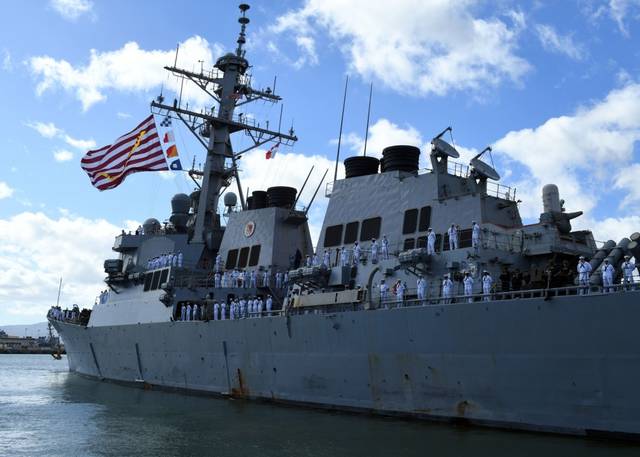Pearl warship angers China

COURTESY U.S. NAVY
Guided-missile destroyer USS Hopper (DDG 70) departs Joint Base Pearl Harbor-Hickam for its independent deployment to the Western Pacific and Middle East. While deployed, the ship will conduct theater security cooperation and maritime presence operations with partner nations.
China complained today that the Pearl Harbor destroyer USS Hopper sailed Wednesday nearby Scarborough Shoal in the South China Sea, territory claimed by China, the Philippines and Taiwan, in what the United States calls a freedom of navigation operation.
The shoal, which China calls Huangyan Dao, is about 120 miles west of Luzon in the Philippines.
China Foreign Ministry spokesman Lu Kang said Hopper sailed within 12 nautical miles of Scarborough Shoal “without gaining permission from the Chinese government.”
“The Chinese Navy carried out identification and verification procedures in accordance with law and warned the U.S. vessel to leave,” Lu said.
Lu added that the Pearl Harbor warship “violated China’s sovereignty and security interests.”
China state news agency Xinhua reported that its Ministry of National Defense told the United States not to “cause trouble out of nothing,” and to respect the sovereignty of China.
Don't miss out on what's happening!
Stay in touch with breaking news, as it happens, conveniently in your email inbox. It's FREE!
After Hopper entered waters around Scarborough Shoal, the Chinese missile destroyer Huangshan “immediately conducted an identification and warning process to drive it away,” Xinhua said.
The U.S. Navy periodically conducts freedom of navigation operations, or FONOPs, near disputed islands in the South China Sea. China increasingly is making claims over much of the region and has been creating manmade islands fortified with missile defenses.
The United States is worried about free passage through the region through which $3 trillion in annual trade passes.
“The United States conducts routine and regular FONOPs, as we have done in the past and will continue to do so in the future,” Lt. Cmdr. Nicole Schwegman, a U.S. Pacific Fleet spokeswoman, said in an email. “We have a comprehensive FONOP program under which U.S. forces challenge excessive maritime claims across the globe to demonstrate our commitment to uphold the rights, freedoms and lawful uses of the sea and airspace guaranteed to all nations under international law. FONOPs are not about any one country, nor are they about making political statements. FONOPS are designed to comply with international law and not threaten the lawful security interest of coastal States.”
Adm. Harry Harris, head of U.S. Pacific Command on Oahu, said on Jan. 12 in Honolulu that “our opportunities in the Indo-Pacific are abundant, but the path is burdened by several considerable challenges, including China, ISIS, and North Korea.”
Harris noted “an increasingly assertive China.”
“Some view China’s actions in the East and South China Seas as opportunistic. I do not. I view them as coordinated, methodical, and strategic. Beijing has choices to make: they can choose to disregard the rules-based international order or they can contribute to it as a responsible stakeholder. Their actions – not ours – will tell us what kind of nation they’ll be for the 21st Century,” Harris said.
The guided-missile destroyer Hopper left Pearl Harbor for an independent deployment to the Western Pacific and Middle East on Sept. 28.
The Navy said Hopper has a crew of nearly 330 officers and enlisted sailors and is a multi-mission ship designed to operate independently or with an associated strike group.
The Navy said while deployed, Hopper would conduct theater security cooperation and maritime presence operations with partner nations.



